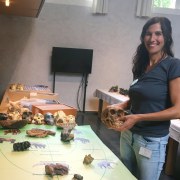Evolution is the cornerstone of modern biology and is central to the public understanding of science. Scientific literacy in evolution is crucial if citizens are to make informed decisions on societal issues including climate change, food security, antibiotic resistance or biodiversity loss. Understanding that human diversity is a result of evolution also affects social cohesion and promotes more inclusive societies. However, research shows that acceptance and understanding of evolution varies throughout the world. This is partly because evolution is often not covered adequately in school curricula. Natural history museums, science centres, zoos and botanic gardens, as places that promote lifelong learning, therefore have a major role to play in the public understanding of evolution.
Professor of science and environmental education
University College London
London
United Kingdom
science communicator & Science Policy Adviser
EvoKE- Evolutionary Knowledge for Everyone | SCNAT
The EvoKE project (European Knoweldge for Everyone https://evokeproject.org/) is a European wide initiative that aims to foster the public understanding of evolution. EvoKE brings together a diverse group of stakeholders: scientists, media, museum and science centre professionals and educators to openly discuss what collaborations and projects can be designed to promote the understanding of evolution. In this time slot, I will focus on the important role that museums and science centres have to play in the project.
Educational Content Developer
Naturalis Biodiversity Center
Leiden
Netherlands
At Naturalis we engage families and students in the science of human evolution with an inquiry-based workshop. Visitors investigate characteristics of various hominid skulls and ancestors. They observe, discuss and reason about form, function and origin of features. After this the group creates its own family tree. Finally they discuss the science of human evolution, (sometimes) stimulated by the confrontation with a skull which place in the tree is uncertain. How do we know what we know?
Head curator
Conservatoire & Jardin botaniques de Genève
Geneva
Switzerland
“Trivial Evolution: Plants” is a game designed to explore the evolutionary history of land plants. It allows players to explore many issues such as biodiversity on Earth, evolutionary patterns, classification and conservation. All the plants included in the game set are also cultivated in the Botanical Garden, for players to see them alive.This game is an excellent asset for outreach activities bridging the gap between the Geneva botanical garden’s scientific mission and the public.
Former Deputy Director
Aarhus
Denmark
The Ecsite Nature Group aims to bring a cross fertilization between science centres, natural history museums, research institutions, universities, aquariums and zoos. All these organizations tackle nature related issues in many ways and evolution is at the core of these issues. I will talk about best practices that public outreach and research institutions can employ and can employ to engage their audiences in a better understanding of evolution.





